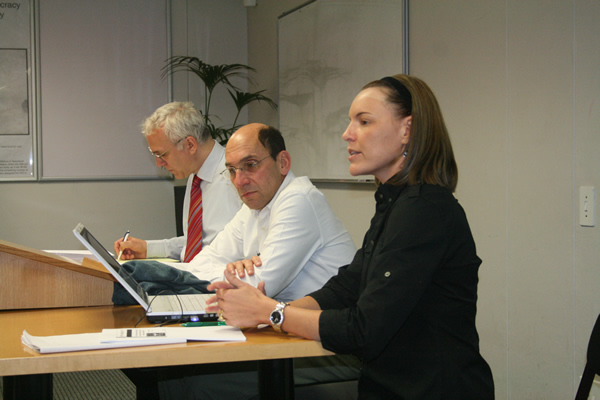A panel discussion on accountability and responsibility of international financial institutions was held on 20 June 2012 at the Centre for Human Rights.
The presenters were Prof Jan Wouters from the University of Leuven and Dr Andria Naude-Fourie from Erasmus University, the Netherlands. The panel discussion was moderated by Professor Danny Bradlow, the head of the International Development Law Unit at the Centre for Human Rights.
In her presentation titled ‘The role of independent accountability mechanisms (IAMs) at multilateral development banks (MDBs)’, Dr Naude-Fourie introduced a number of IAMS. The focus of her presentation was on the role of the World Bank Inspection Panel in enhancing external and internal accountability of the Bank. She concluded that the Inspection Panel has improved its accountability to internal stakeholders (governing board, staff), and in some measured degree, to its external stakeholders (e.g. those affected by projects).
Professor Jan Wouters focused in his presentation on the European Investment Bank (EIB), which is the largest multilateral development bank in the world operating not only in the EU but across the world, including in Africa. Introducing the EIB and its activities, from substantive and procedural points of view, Professor Wouters reviewed the EIB external accountability. As he further explained, the substantive accountability principles include the EU policies, social and environmental principles and standards which the EIB has identified for itself and committed to follow throughout its operations. In discussing the procedural accountability, he highlighted how principles such as transparency, participation and remedies operate with the EIB, drawing examples from projects being implemented as well as the mechanisms offered to external stakeholders to seek redress from the EIB.
The Panellists responded to comments and questions made by participants on issues concerning free prior informed consent, particularly as it applies to indigenous peoples. Other issues raised in the course of discussion were governance of the EIB, co-financing of projects and possibility of extraterritorial action at the European Court of Justice against EIB by those affected by its projects being implemented in Africa. In rounding up, Professor Bradlow thanked the audience for the interesting experience, noting that the activities of the World Bank and EIB will continue to attract scholarly attention and draw public interest owing to their importance to development in Africa.


